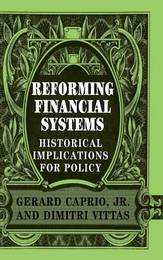
|
Reforming Financial Systems: Historical Implications for Policy
Hardback
Main Details
| Title |
Reforming Financial Systems: Historical Implications for Policy
|
| Authors and Contributors |
Edited by Gerard Caprio, Jr., Jr
|
|
Edited by Dimitri Vittas
|
| Physical Properties |
| Format:Hardback | | Pages:236 | | Dimensions(mm): Height 237,Width 160 |
|
| Category/Genre | Economics
Banking |
|---|
| ISBN/Barcode |
9780521581158
|
| Classifications | Dewey:332.109 |
|---|
| Audience | | Professional & Vocational | |
|---|
| Illustrations |
20 Tables, unspecified; 14 Line drawings, unspecified
|
|
Publishing Details |
| Publisher |
Cambridge University Press
|
| Imprint |
Cambridge University Press
|
| Publication Date |
13 June 1997 |
| Publication Country |
United Kingdom
|
Description
This volume summarizes the key lessons of financial history for emerging market and developing economies, mostly drawn from when OECD economies themselves were industrializing and did not possess the checks, balances, and supervisory capabilities they have today. The topics include the role of central banks, debates on how to make banking secure and sound, the relative efficiency of universal banking (compared with the Anglo-American commercial banking model), and the role of savings banks, nonbanks, and securities markets in development.
ReviewsAdvance praise: 'What a good idea to assemble a group of top financial historians and ask them to review the origins of the institutions of banking and financial policy. This excellent collection is perfectly designed for the many reflective policymakers now seeking to reform their financial systems. The authoritative treatment extends not only to commercial and central banking, but also to thrift institutions, pensions and securities markets. The authors describe both how the large degree of consensus emerged and the vigorous debates that remain: deposit insurance vs. 'depositor beware' and universal banking vs. market segmentation.' Patrick Honohan, Economic and Social Research Institute, Dublin Advance praise: 'Reforming Financial Systems by Gerard Caprio and Dimitri Vittas is an extraordinary compendium of different historical experiences with the development and regulation of the financial system. It genuinely delivers on the promise of one of its chapter titles: it provides important lessons from the past for present-day financial reforms.' Bruce Smith, University of Texas, Austin
|